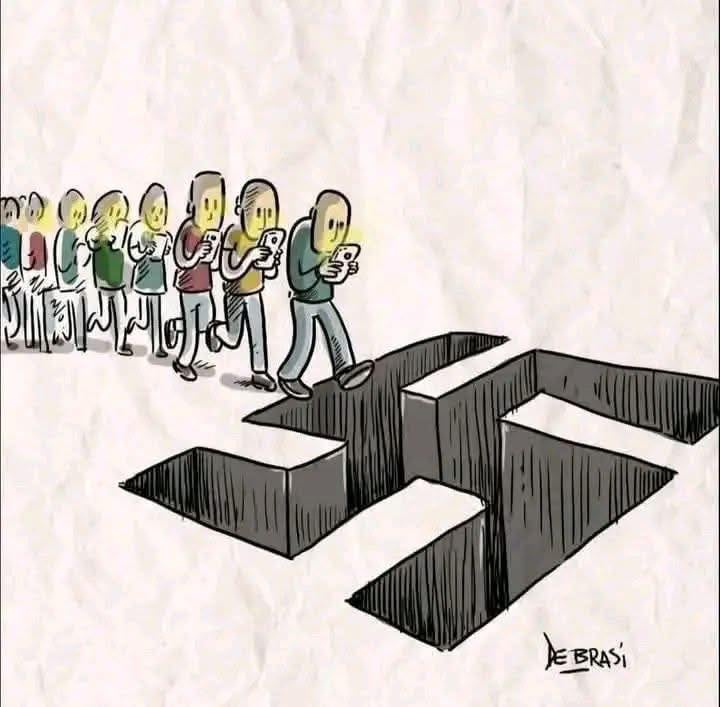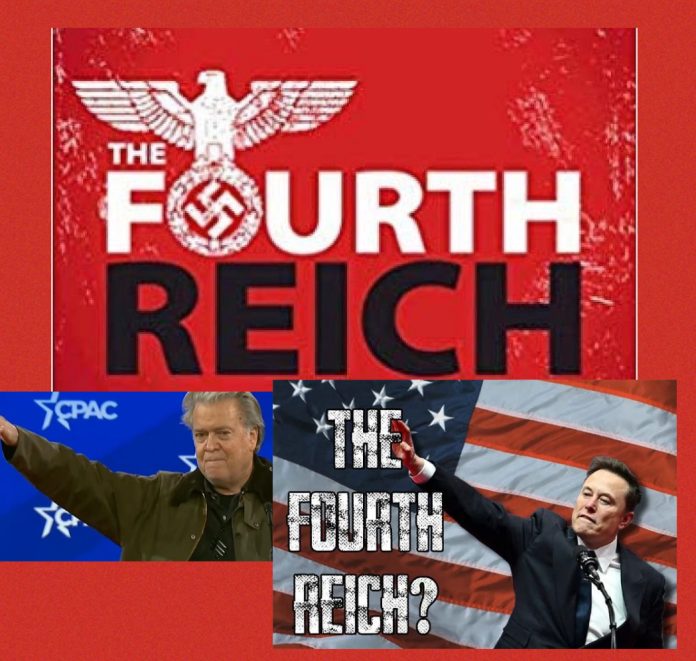The spectre of a “Fourth Reich” has haunted political discourse for decades, often invoked as a warning against the resurgence of authoritarianism, nationalism, or fascism. To understand whether such a possibility is more than mere speculation, we must delve deeply into the historical precedents of the First, Second, and Third Reichs, examining their origins, contradictions, and legacies. By applying dialectical reasoning, a method that examines the interplay of opposing forces, we can trace the patterns of history and assess whether the conditions for a Fourth Reich are emerging in our contemporary world. The following will explore these ideas weaving together historical analysis and philosophical reflection, while also examining the role of contemporary authoritarian leaders and movements such as Donald Trump, Nigel Farage, Benjamin Netanyahu, Viktor Orbán, Recep Tayyip Erdoğan, the MAGA movement, Reform UK, and others.
The First Reich: The Holy Roman Empire (800–1806)
The First Reich, known as the Holy Roman Empire, was a sprawling and fragmented entity that dominated Central Europe for over a millennium. Its origins lie in the coronation of Charlemagne in 800 AD, an event that symbolised the fusion of Roman imperial tradition with Christian authority. Yet, the Holy Roman Empire was neither holy, nor Roman, nor a true empire in the modern sense. It was a patchwork of feudal territories, ecclesiastical states, and free cities, loosely bound together under the nominal authority of an emperor. This decentralised structure was both its strength and its weakness, allowing for regional autonomy but also fostering constant internal conflict.
The empire’s identity was deeply tied to Christianity, particularly Catholicism, which served as a unifying force in a politically fragmented landscape. However, this religious unity was shattered by the Protestant Reformation in the 16th century, which exposed the empire’s underlying contradictions. The Peace of Westphalia in 1648, which ended the Thirty Years’ War, further eroded the emperor’s authority by granting sovereign rights to the empire’s constituent states. By the time Napoleon dissolved the Holy Roman Empire in 1806, it had become an anachronism, unable to adapt to the rising tide of nationalism and modernity.
Dialectical Analysis:
The Holy Roman Empire can be seen as the thesis of medieval unity, a system that sought to balance spiritual and temporal authority. However, its internal contradictions, such as the tension between centralisation and regionalism, and the clash between religious orthodoxy and reform, created the antithesis of fragmentation and conflict. The synthesis that emerged was the modern nation-state, a centralised political entity that replaced feudal structures with bureaucratic governance and secular authority.
The Second Reich: The German Empire (1871–1918)
The Second Reich emerged in 1871, following the unification of Germany under the leadership of Prussia and its chancellor, Otto von Bismarck. This new empire was a product of both diplomacy and war, forged in the crucible of the Franco-Prussian conflict. The Second Reich was a federal state, with the Kaiser as its symbolic head, but real power lay in the hands of the Prussian elite. It was an era of rapid industrialisation, scientific advancement, and imperial ambition, as Germany sought to establish itself as a global power.
Yet, the Second Reich was also marked by profound social and political tensions. The rise of socialism and the labour movement challenged the conservative establishment, while the Kaiser’s aggressive foreign policy alienated other European powers. The empire’s militarism and imperial ambitions ultimately led to its downfall in World War I, a conflict that exposed the fragility of its political and social order. The Treaty of Versailles, which formally ended the war, imposed harsh penalties on Germany, sowing the seeds of resentment that would later fuel the rise of Nazism.
Dialectical Analysis:
The Second Reich represented the thesis of a unified, industrialised nation-state, a powerful entity that sought to assert its dominance on the world stage. However, its contradictions, such as the clash between authoritarian rule and democratic aspirations, and the tension between imperial ambition and domestic stability, created the antithesis of war and revolution. The synthesis that emerged was the Weimar Republic, a democratic experiment that sought to reconcile these contradictions but was ultimately undermined by economic crisis and political extremism.
The Third Reich: Nazi Germany (1933–1945)
The Third Reich, under Adolf Hitler’s Nazi regime, was a totalitarian state that sought to reshape the world according to its ideology of racial supremacy and militaristic expansion. It emerged from the ashes of the Weimar Republic, which had been weakened by hyperinflation, political violence, and the Great Depression. The Nazis exploited these crises, promising to restore Germany’s greatness and eliminate its perceived enemies, both internal and external.
The Third Reich was characterised by its extreme nationalism, anti-Semitism, and totalitarian control. It sought to create a racially pure society, a goal that led to the genocide of six million Jews and millions of others during the Holocaust. The regime’s aggressive expansionism plunged the world into World War II, a conflict that resulted in unprecedented destruction and loss of life. The Third Reich’s collapse in 1945 marked the end of its brutal reign, but its legacy continues to haunt the collective memory of humanity.
Dialectical Analysis:
The Third Reich emerged as the thesis of fascism, a radical response to the perceived failures of liberal democracy and the Treaty of Versailles. Its contradictions, such as the unsustainable nature of its militarism and the moral abhorrence of its racial policies, created the antithesis of global resistance and eventual defeat. The synthesis that emerged was the post-war world order, characterised by the establishment of the United Nations, the Universal Declaration of Human Rights, and the division of the world into ideological blocs during the Cold War.
The Fourth Reich: A Shadow on the Horizon?

The idea of a Fourth Reich is often dismissed as alarmist, but it serves as a powerful metaphor for the resurgence of authoritarianism, nationalism, and xenophobia in the 21st century. While the term is historically rooted in Germany’s past, its implications are global, reflecting broader trends that threaten the stability of democratic societies. To understand the potential for a Fourth Reich, we must examine the rise of contemporary authoritarian leaders and movements, whose rhetoric and policies echo those of past regimes.
Donald Trump and the MAGA Movement
Donald Trump’s presidency marked a significant shift in American politics, characterised by populist rhetoric, nationalist policies, and a disregard for democratic norms. Trump’s slogan, “Make America Great Again” (MAGA), appealed to those who felt left behind by globalisation and cultural change. His administration was marked by attacks on the media, the judiciary, and political opponents, as well as a willingness to exploit racial and cultural divisions for political gain. The storming of the U.S. Capitol on January 6, 2021, by Trump supporters seeking to overturn the election results, highlighted the dangers of his authoritarian tendencies.
Nigel Farage and Reform UK
In the United Kingdom, Nigel Farage has been a prominent figure in the rise of right-wing populism. As the leader of the UK Independence Party (UKIP) and later the Brexit Party (now Reform UK), Farage played a key role in the campaign for Brexit, which was driven by anti-immigrant sentiment and a rejection of the European Union. Farage’s rhetoric often targets elites and immigrants, portraying them as threats to British identity and sovereignty. While Farage himself has only recently become an MP, his influence on British politics has been profound, contributing to the rise of a more divisive, insular and nationalist political climate.
Benjamin Netanyahu and Israeli Authoritarianism
Benjamin Netanyahu, Israel’s longest-serving prime minister, has been accused of undermining democratic institutions and the rule of law. His government has pursued policies that marginalise Palestinian citizens and expand Israeli settlements in the occupied territories, exacerbating tensions in the region. Netanyahu’s alliance with far-right parties and his use of divisive rhetoric have raised concerns about the erosion of democratic norms in Israel.
Viktor Orbán and Illiberal Democracy in Hungary
Viktor Orbán, Hungary’s prime minister, has been a leading proponent of what he calls “illiberal democracy.” Orbán’s government has centralised power, undermined the independence of the judiciary, and restricted press freedom. His rhetoric often targets immigrants, LGBTQ+ communities, and George Soros, a billionaire philanthropist whom Orbán portrays as a shadowy globalist conspirator. Orbán’s policies have drawn criticism from the European Union, but he has become a symbol of the rise of authoritarianism within the bloc.
Recep Tayyip Erdoğan and Turkey’s Authoritarian Turn
Recep Tayyip Erdoğan, Turkey’s president, has transformed the country from a secular democracy into an increasingly authoritarian state. Erdoğan has consolidated power by cracking down on dissent, imprisoning journalists, and purging political opponents. His government has also pursued an aggressive foreign policy, intervening in conflicts in Syria and Libya. Erdoğan’s use of nationalist and religious rhetoric has polarised Turkish society and undermined democratic institutions.
Other Authoritarian Leaders and Movements
Beyond these figures, there are numerous other leaders and movements that embody the trends of authoritarianism and nationalism. In Brazil, Jair Bolsonaro has been accused of undermining democratic norms and promoting far-right ideologies. In India, Narendra Modi’s government has been criticised for its treatment of religious minorities and its erosion of press freedom. In Russia, Vladimir Putin has maintained power through a combination of repression, propaganda, and nationalist rhetoric.
Dialectical Analysis:
The current global order, characterised by liberal democracy and globalisation, can be seen as the thesis. However, its contradictions, such as economic inequality, cultural dislocation, and environmental degradation, are generating an antithesis in the form of populism, nationalism, and authoritarianism. The synthesis could take many forms, ranging from a renewed commitment to democratic values to the emergence of a new authoritarian order.
Confronting the Shadows of the Future
History does not repeat itself in a linear fashion, but it often follows patterns shaped by the interplay of opposing forces. The First, Second, and Third Reichs each arose from specific historical conditions and contradictions, and their legacies continue to shape our world. While the term “Fourth Reich” may be sensationalistic, the underlying trends of authoritarianism, nationalism, and social fragmentation are real and concerning.
To avoid the mistakes of the past, we must confront these challenges head-on. This requires strengthening democratic institutions, addressing economic inequality, and fostering a sense of shared humanity. By applying the lessons of history and embracing dialectical thinking, we can work towards a future that avoids the horrors of previous Reichs and builds a more just and equitable world.
The question of whether we are heading towards a Fourth Reich is not just about Germany or Europe; it is about the global struggle between authoritarianism and democracy, and the choices we make as a society. The shadows of the past loom large, but they also serve as a reminder of the importance of vigilance, resilience, and hope.







